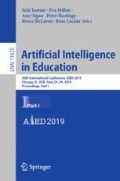Abstract
Identifying the mathematical skills or knowledge components needed to solve a math problem is a laborious task. In our preliminary work, we had two expert teachers identified knowledge components of a state-wide math test and they only agreed only on 35% of the items. Previous research showed that machine learning could be used to correctly tag math problems with knowledge components at about 90% accuracy over more than 100 different skills with five-fold cross-validation. In this work, we first attempted to replicate that result with a similar dataset and were able to achieve a similar cross-validation classification accuracy. We applied the learned model to our test set, which contains problems in the same set of knowledge component definitions, but are from different sources. To our surprise, the classification accuracy dropped drastically from near-perfect to near-chance. We identified two major issues that cause of the original model to overfit to the training set. After addressing the issues, we were able to significantly improve the test accuracy. However, the classification accuracy is still far from being usable in a real-world application.
Access this chapter
Tax calculation will be finalised at checkout
Purchases are for personal use only
References
Apté, C., Damerau, F., Weiss, S.M.: Automated learning of decision rules for text categorization. ACM Trans. Inf. Syst. (TOIS) 12(3), 233–251 (1994)
Breiman, L.: Random forests. Mach. Learn. 45(1), 5–32 (2001)
Cheng, H., Rokicki, M., Herder, E.: The influence of city size on dietary choices. In: Adjunct Publication of the 25th Conference on User Modeling, Adaptation and Personalization, pp. 231–236. ACM (2017)
Immitzer, M., Atzberger, C., Koukal, T.: Tree species classification with random forest using very high spatial resolution 8-band worldview-2 satellite data. Remote Sens. 4(9), 2661–2693 (2012)
Karlovčec, M., Córdova-Sánchez, M., Pardos, Z.A.: Knowledge component suggestion for untagged content in an intelligent tutoring system. In: Cerri, S.A., Clancey, W.J., Papadourakis, G., Panourgia, K. (eds.) ITS 2012. LNCS, vol. 7315, pp. 195–200. Springer, Heidelberg (2012). https://doi.org/10.1007/978-3-642-30950-2_25
Lewis, D.D., Ringuette, M.: A comparison of two learning algorithms for text categorization. In: Third Annual Symposium on Document Analysis and Information Retrieval, vol. 33, pp. 81–93 (1994)
Pardos, Z.A., Dadu, A.: Imputing KCS with representations of problem content and context. In: Proceedings of the 25th Conference on User Modeling, Adaptation and Personalization, pp. 148–155. ACM (2017)
Svetnik, V., Liaw, A., Tong, C., Culberson, J.C., Sheridan, R.P., Feuston, B.P.: Random forest: a classification and regression tool for compound classification and QSAR modeling. J. Chem. Inf. Comput. Sci. 43(6), 1947–1958 (2003)
Wang, Y., Heffernan, N.T.: The effect of automatic reassessment and relearning on assessing student long-term knowledge in mathematics. In: Trausan-Matu, S., Boyer, K.E., Crosby, M., Panourgia, K. (eds.) ITS 2014. LNCS, vol. 8474, pp. 490–495. Springer, Cham (2014). https://doi.org/10.1007/978-3-319-07221-0_61
Zhao, S., Zhang, Y., Xiong, X., Botelho, A., Heffernan, N.: A memory-augmented neural model for automated grading. In: Proceedings of the Fourth (2017) ACM Conference on Learning@ Scale, pp. 189–192. ACM (2017)
Acknowledgements
We thank multiple current NSF grants (IIS-1636782, ACI-1440753, DRL-1252297, DRL-1109483, DRL-1316736, DGE-1535428 & DRL-1031398), the US Dept. of Ed (IES R305A120125 & R305C100024 and GAANN), and the ONR.
Author information
Authors and Affiliations
Corresponding author
Editor information
Editors and Affiliations
Rights and permissions
Copyright information
© 2019 Springer Nature Switzerland AG
About this paper
Cite this paper
Patikorn, T., Deisadze, D., Grande, L., Yu, Z., Heffernan, N. (2019). Generalizability of Methods for Imputing Mathematical Skills Needed to Solve Problems from Texts. In: Isotani, S., Millán, E., Ogan, A., Hastings, P., McLaren, B., Luckin, R. (eds) Artificial Intelligence in Education. AIED 2019. Lecture Notes in Computer Science(), vol 11625. Springer, Cham. https://doi.org/10.1007/978-3-030-23204-7_33
Download citation
DOI: https://doi.org/10.1007/978-3-030-23204-7_33
Published:
Publisher Name: Springer, Cham
Print ISBN: 978-3-030-23203-0
Online ISBN: 978-3-030-23204-7
eBook Packages: Computer ScienceComputer Science (R0)

